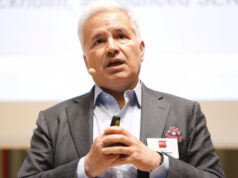
Ultimovacs når proof-of-concept med cancervaccinet UV1
Ultimovacs har rapporterat positiva fas II-data gällande total överlevnad i mesoteliom med sin cancervaccinkandidat UV1. Datan kommer att presenteras av huvudprövaren för NIPU-studien, Professor Åslaug Helland, vid ESMO-kongressen 2023. BioStock pratade med Ultimovacs Director Medical Affairs, Espen Basmo Ellingsen, för att få en bättre förståelse för betydelsen av dessa resultat.
Ultimovacs utvecklar UV1, ett universellt cancervaccin som syftar till att stärka patientens immunsystem för att sakta ner cancerns tillväxt. Bolaget har fem pågående kliniska fas II-studier som utvärderar UV1 inom olika cancerindikationer. NIPU-studien är en prövarinitierad studie fokuserad på mesoteliom – en obotlig sjukdom och en av de mest aggressiva formerna av cancer. Läs mer om mesoteliom och hur Ultimovacs adresserar sjukdomen här.
NIPU sponsras av Oslo universitetssjukhus och syftar till att undersöka om kombinationen av UV1 med checkpointhämmarna (checkpoint inhibitors, CPIs) ipilimumab och nivolumab kan förlänga den totala överlevnaden (overall survival, OS) hos patienter med icke-opererbar malign pleuramesoteliom (MPM) som en andra linjens behandling.
Dessa CPIs förbättrar markant den totala överlevnaden (OS) som första linjens behandling och innebär det första framsteget inom mesoteliomterapi på två decennier. Trots framstegen har denna sjukdom fortfarande endast en OS på cirka ett år, och det finns inga godkända andra linjens behandlingar. Detta innebär att om den primära, initiala behandlingen visar sig vara ineffektiv, finns det inga möjliga återstående behandlingsalternativ för patienterna.
Motsägelsefull tolkning av topline-resultat
I juni i år presenterade Ultimovacs en uppdatering från studien som visade topline-resultat avseende progressionsfri överlevnad (progression-free survival, PFS), vilket var det primära utfallsmåttet för denna studie. Baserat på huvudgranskningen uppfyllde studien inte detta utfallsmått. Utredarens bedömning av PFS, en fördefinierad stödjande analys, visade dock en statistiskt signifikant fördel för patienterna i UV1-gruppen.
Enligt studiens huvudutredare, professor Åslaug Helland, är OS och inte PFS, det viktigaste effektmåttet inom cancerbehandling. Faktum är att historiskt sett – även i tidigare studier av mesoteliom, observerades ingen fördel på PFS med checkpointhämmare, troligen på grund av sjukdomens allvarliga natur och snabba progression.
I en videointervju med BioStock, upprepade Jens Bjørheim, CMO på Ultimovacs, några av professor Hellands tankar. Han menade att man behöver invänta överlevnadsdata för att få mer klarhet rörande UV1:s effektivitet. Se intervjun här.
Överlevnadsfördel bekräftar UV1:s potential
Oavsett kontroversen kring PFS, beslutade FDA nyligen att bevilja orphan drug designation till UV1 som behandling av mesoteliom. Ultimovacs vd Carlos de Sousa menade att “gaining FDA orphan drug designation for UV1 in mesothelioma highlights UV1’s potential and the significant need for new treatment options for this patient population.”
Bolaget tillkännagav nyligen den mycket efterlängtade OS-datan från NIPU, vilket stärkte den förmodade potentialen ytterligare. Enligt pressmeddelandet från Ultimovacs den 17 oktober visade UV1, i kombination med CPI:erna ipilimumab och nivolumab, en kliniskt meningsfull fördel på OS jämfört med endast CPI:erna, samtidigt som en stark säkerhetsprofil upprätthölls.
Mer specifikt så minskade adderandet av UV1 till de två CPI:erna risken för död med 27 procent – vilket nådde den fördefinierade tröskeln för statistisk signifikans i studien. Dessutom visar datan en fördel i form av objektiv svarsfrekvens (observerad tumörminskning med mer än 30 procent). I UV1-gruppen uppvisade 31 procent av patienterna ett objektivt svar, jämfört med 16 procent i kontrollgruppen.
Professor Helland kommer att presentera hela resultatet den 21 oktober vid ESMO-kongressen 2023 i Madrid. Därefter, den 23 oktober, kommer han tillsammans med Ultimovacs ledning att hålla en webbsändning där datan förklaras.
En betydande milstolpe för cancervaccin
Detta är en betydande milstolpe, inte bara för Ultimovacs, utan för hela cancervaccinfältet. Utfallet av denna studie betonar det första påvisandet av ett universellt cancervaccins effektivitet och terapeutiska inverkan i en randomiserad klinisk fas II-studie, vilket därmed stöder fortsatt klinisk utveckling. Dessa resultat innebar att Ultimovacs aktiekurs stack iväg upp med cirka 30 procent.
Vad väntar UV1 härnäst?
BioStock kontaktade Ultimovacs Director Medical Affairs Espen Basmo Ellingsen för att få veta mer.
Espen, starting with the basics of mesothelioma, how bad is this disease?
– Malignant pleural mesothelioma is a particularly challenging disease with a grim prognosis. This rare and aggressive form of cancer originates from the lining of the lungs, often attributed to asbestos exposure. The 5-year relative survival rate varies, ranging from a mere 7 per cent for advanced cases to a relatively higher but still concerning 24 per cent for localised cases. The difficulties in treating mesothelioma stem from its aggressive nature, late-stage diagnosis, and limited effective treatment options.
How is the disease currently treated?
– Traditionally, mesothelioma has been managed through chemotherapy, with limited advancements in treatment strategies over the last decade. In a notable development in 2020, the FDA approved ipilimumab and nivolumab as first-line treatments for mesothelioma. However, while this represents progress, the drugs offer moderate clinical benefits, especially when compared to other tumour types like melanoma. Importantly, if a patient doesn’t respond to or progresses on first-line treatment, the available therapeutic options become even scarcer. Currently, there are no drugs with FDA approval for second-line treatment in mesothelioma.

The topline results presented in June generated some confusion due to the contradictory readings of PFS from the external and local reviewers. Is that confusion extinguished now that OS data is out?
– Progression-free survival (PFS) serves as a surrogate marker for overall survival (OS), providing a way to assess clinical benefit without the longer follow-up necessary for determining OS. It’s important to understand that in some cases, PFS might not align with OS. For example, recent phase III trials in mesothelioma, such as those involving ipilimumab plus nivolumab and pembrolizumab plus chemotherapy, showed no clear PFS benefit, yet an OS benefit remained statistically significant. This same trend was observed in the NIPU trial. While PFS data created initial confusion, the more mature OS results presented at ESMO demonstrated a notable 27 per cent reduction in the risk of death. OS is a robust, unbiased “hard endpoint,” and these results form a strong foundation for further development of UV1 in this indication. Importantly, the addition of UV1 to ipilimumab and nivolumab did not increase the toxicity of the latter two drugs, reinforcing the clinical relevance of these findings.
What do these results mean for MPM patients, and what comes next for NIPU?
– Patients with MPM are currently an underserved population with a high unmet medical need. We are very encouraged by these results as they support moving UV1 into a phase III trial in this indication. A natural path forward may be to move the testing of UV1 to the first-line setting, where now ipilimumab and nivolumab are considered a standard of care. We believe that if these survival results are replicated in a larger trial, UV1 could offer a much-needed and attractive treatment option for patients with MPM.
Finally, what do these results mean for UV1 and the other four phase II trials?
– The NIPU trial is just the first of five randomised phase II trials, each playing a vital role in expanding our understanding of UV1’s potential. Mesothelioma, with its notoriously aggressive nature, was a demanding initial target. Melanoma, for instance, is a tumour type much more susceptible to immunotherapies in general. We’ve completed two phase I trials in melanoma and are actively progressing with our randomised phase II trial, INITIUM. The recent revelation of sustained high OS results from the phase I trial of UV1 in combination with pembrolizumab for melanoma gives promise to the efficacy of this immunotherapy approach for melanoma. For the INITIUM trial involving UV1 plus ipilimumab and nivolumab, the accrual of PFS events has proven to be slower than expected based on historical trials with the checkpoint inhibitors alone. As of August, we had yet to reach the requisite 70 PFS events needed for the trial’s read-out. As previously communicated, we now anticipate that the INITIUM trial’s results will be available in the first half of 2024.
– The encouraging outcomes from the NIPU trial fuel our optimism for the results of the other ongoing trials. These ongoing trials collectively underscore our commitment to expanding the potential of UV1 across a spectrum of cancer types.
Innehållet i BioStocks nyheter och analyser är oberoende men BioStocks verksamhet är i viss mån finansierad av bolag i branschen. Detta inlägg avser ett bolag som BioStock erhållit finansiering från.


